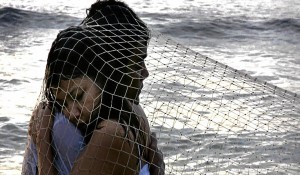
Gozum said “Anacbanua,” which won the Prix de Signes in the Paris fest’s Cinema in Transgression section, went beyond Pangasinan’s poetry tradition. “The anlong, or Pangasinense poems that are featured in the film, articulate my province’s distinct culture and identity,” he said.
The film has traveled beyond local shores. Before the Paris win, “Anacbanua” was screened in festivals in Mumbai, Bangkok, Jeonju and Prague.
“Terms like ‘regional cinema’ or ‘regional art’ no longer make sense to me,” Gozum elaborated. “Artists from the provinces don’t need [the Cultural Center of the Philippines’ stamp of] approval to be appreciated and recognized by foreign audiences.”
He found out about the Signes de Nuit fest through the website of the British Council. After making a cold call, he sent DVDs of his films, “Anacbanua” and “Gurgurlis Ed Banua (Landscape With Figures),” to the Paris fest organizers.
He soon received an e-mail from fest programmer Dieter Wieczorek inviting him not only to screen his two films but to act as jury member as well. (Unfortunately, he couldn’t get away from his work in Riyadh.)
In any case, “Anacbanua” won an award and was aired on Tele Bocal, a French channel that showcases experimental films, on Oct. 26.
Previously, “Anacbanua” won the Digital Lokal Lino Brocka grand prize and best director award at the Cinemanila fest in 2009.
Three hours
Last year, he screened his latest film, a three-hour experimental documentary, “Lawas Kan Pinabli (Forever Loved),” at the Cinemanila, Cinema Rehiyon, the Edinburgh International Film Festival and the Yerba Buena Arts Center in San Francisco.
“Lawas Kan Pinabli” tells the story of overseas Filipino workers (OFWs) in the Middle East.
In the pipeline are two more indie films on Pangasinan: “Say Kalayan Na Linang Tan Balitok (The River of Silt and Gold)” and “Luyag D’ara’y Anino (Kingdom of Shadows).”
“Both these projects are on the research and writing stages,” he said. “‘Say Kalayan’ is an experimental docu about Pangasinan and Ibaloi communities living along Agno River. ‘Luyag’ is a feature film about a middle-aged OFW employed as a shepherdess in a remote mountain village in the Middle East. It’s based on a true story.”
Future plans
He said that in a few years, he hopes “to return and settle permanently in my hometown of Bayambang, Pangasinan, to focus on independent filmmaking and organic farming.”
With this goal in mind, he will visit the country in May to “do field research on a new film and plant native trees and vegetables in my small farm in Bayambang.”
He considers the Paris honor as one step that brings him closer to his dream. “It proves to me that my experimentation and risk-taking in cinema has paid off.”
(bayanisandiegojr@gmail.com)